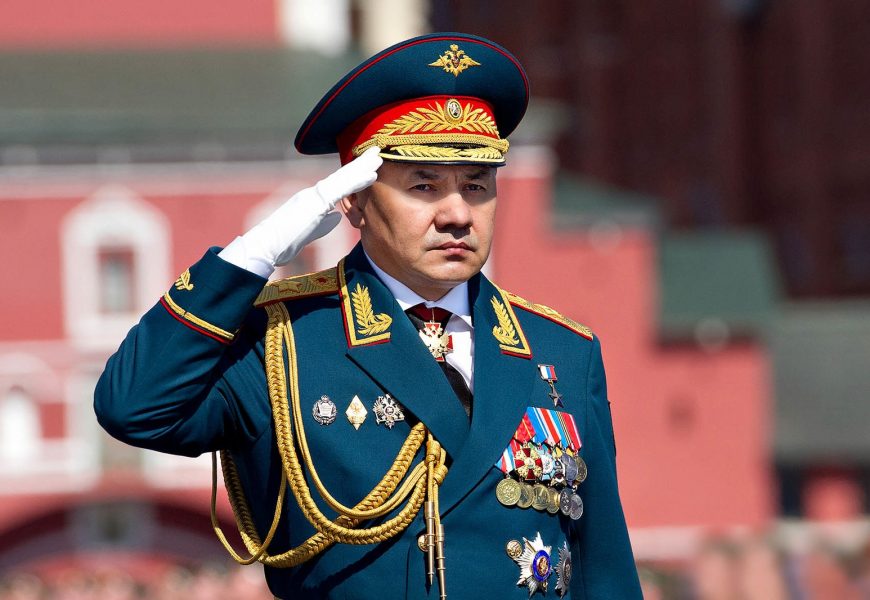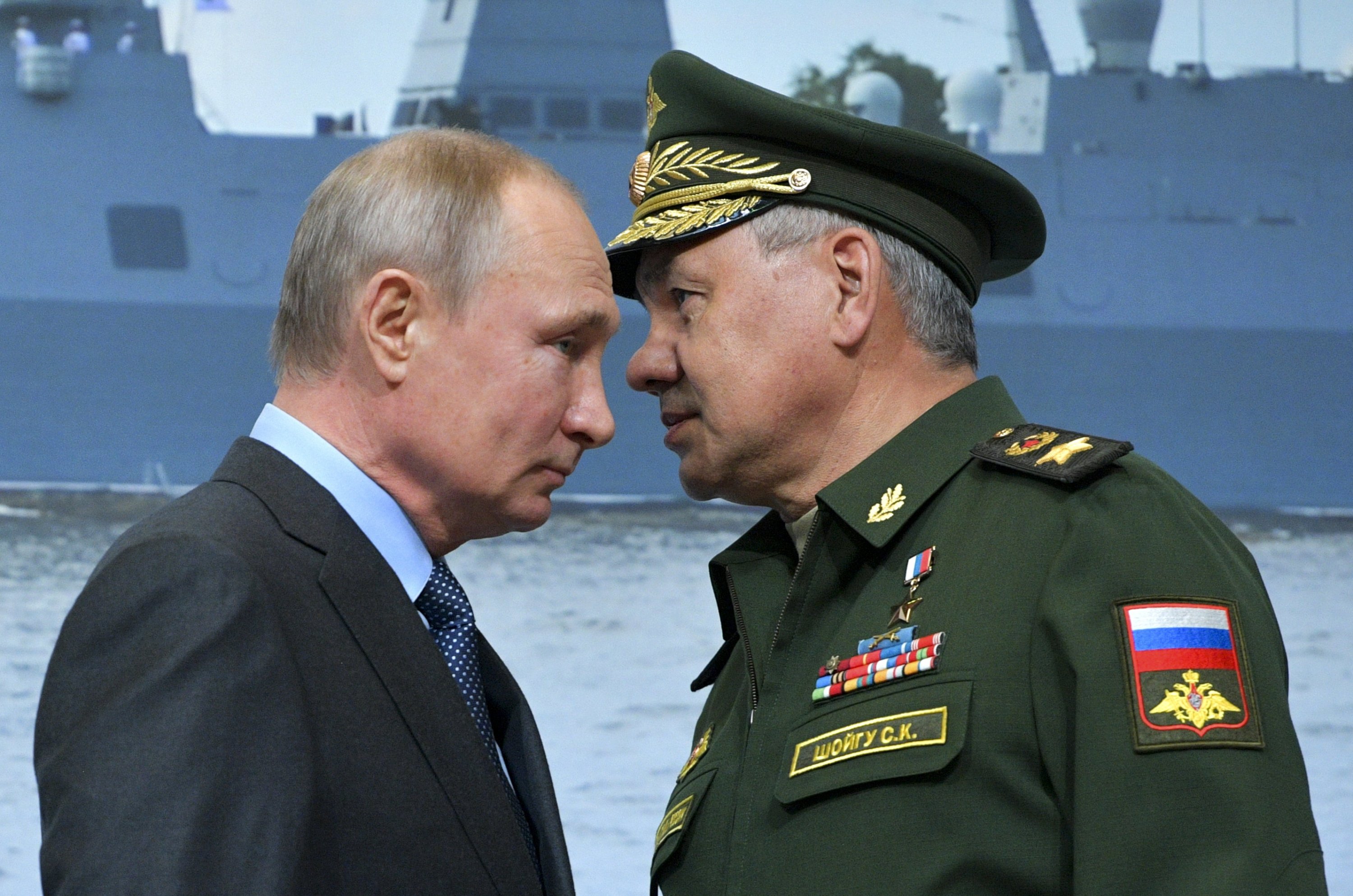Some see him as Putin's heir apparent: who is Sergei Shoigu?
Sergey Shoigu, the longest-serving minister of the Russian Federation, is seen by some experts as his heir of Putin.

According to the polls, Shoigu, the favorite politician of the Russian people after the President, is generally known and promoted in Turkey as the "Minister of Defense of Turkish origin". Having the rank of General and a doctorate in economics, the Minister has been expertly involved in crises in Chechnya, Georgia, Ukraine, and Syria since 1994 and has played an important role in the country's militarization process.
Sergei Kuzhugetovich Shoigu (born 21 May 1955) is a Russian politician who has served as the minister of defense of Russia since 2012. Shoigu has served as the chairman of the Council of Ministers of Defense of the Commonwealth of Independent States since 2012.
Sergei Kujugetovich Shoigu was born on May 21, 1955, in the Tuva Autonomous Soviet Socialist Republic in eastern Siberia. His father, Kujuget Sergeevich, was a journalist, writer, and Communist Party official who also edited Pravda, a member of the Tuva people, one of the Turkic-speaking peoples. His mother, Aleksandra Yakovlevna, is a zootechnician of Russian origin and a deputy in the parliament of the Tıva ASSR. The story of the name Shoigu is interesting: When Sergey's father was born, the census officer mistakenly changed his name and surname and recorded "Shoigu" as a surname, and the family name remained as such. Unlike the Tuvas, who are mostly Buddhist, Sergey Shoigu was baptized in the Orthodox church at the age of 5, under the influence of his mother. Shoigu says he was nicknamed "satan" (the devil) when he was little.
Short life story
Sergey Kujuget-oglu Shoigu is the only Russian politician of Tuvan origin. He has successfully held the post of Minister of Emergencies since 1994. He was appointed to the Ministry of Defense on 6 November 2012. He was born to a Tuvan father and a Russian mother. He also served as the President of the Rescuers and Firefighters Sports Federation.
Born in Chadaana, Tuva Republic, Shoigu graduated from Krasnoyarsk Polytechnical Institute in 1977 as a civil engineer. He worked as a civil engineer for 10 years and improved himself. He started political life in the Communist Party of the Soviet Union in the city of Abakan in 1988, after which he served for several years in the Komsomol. In 1990 he moved from his ancestral homeland, Siberia, to Moscow. He served in the Russian Federation State Architecture Deputy Chief and Building-Construction Commission.
In 1991, he was appointed to the Presidency of the Savior Corps. He served as Minister of State and Minister of Emergency Situations. He became a favorite savior in the eyes of the Russian people. He also became one of the key leaders of the Russian Unity Party. In 1999 he was awarded the hero of Russia.
Shoigu's father is ethnically Tuvan. Sergey Shoigu was married to Irina Shoigu, and two daughters (Yuliya, born in 1977 and Kseniya, 1991) were born from this marriage. His personal hobbies are listening to music, and Vanessa-Mae is a fan. Sergey Shoigu speaks nine languages. Among them, some are dialects of Japanese, English, and Turkish.
Interesting details of his life story
Shoigu graduated from Krasnoyarsk Polytechnic Institute as an engineer in 1977 and worked in many fields from the construction industry to the Communist Party and Komsomol (Soviet Union youth organization) in Siberia until the collapse of the USSR. He went to Moscow in 1990 and was appointed as the Deputy Chief of the State Architecture and Building-Construction Commission of the Russian Federation. Calling the period up to this date "the best age of his life", Shoigu was appointed as the Head of the Rescuer Corps in 1991. He became Minister of Emergency Situations in 1994. He remained in this position until 2012, and during this time he became an important figure in the eyes of the Russians with the roles he played in terrorist attacks, floods, and earthquake disasters. He was awarded the "Medal of Heroism" in 1999.
Shoigu is also Russia's first minister of Tiva origin. He first became involved in Yeltsin's close circle, contributing to Boris Yeltsin's retention of power in 1993; and then the new head of state, with Putin seizing power. He served as Deputy Prime Minister for 5 months (January-May) in 2000, and as Governor of Moscow Oblast for 7 months (May-November) in 2012, thus occupying the highest political positions. In 2012, when Putin and Dmitry Medvedev exchanged the presidency and prime minister again, he was appointed to replace long-time Defense Minister Anatoliy Serdyukov. This date, which can be considered as the turning point of his rapprochement with Putin, was aimed at breaking the power of the ruling "Petersburg group", which some experts included in the former Defense Minister. As a matter of fact, Shoigu was known as an "impartial figure" until then.
Shoigu, who today is called "the Tsar's servant, the father of the soldiers," soon proved his competence. Shoigu, who was appointed the second highest rank in the Russian Army in 2003, was at the forefront of all crises involving Russia. Until the 2010s, he had witnessed all the conflicts in the USSR and Russia and saw the needs of the soldier up close. In 2014, it paved the way for Russia to maintain military bases in Vietnam, Cuba, Nicaragua, Seychelles, and Singapore, and created troops there to protect Russia's interests in the Arctic. Shoigu, accused of aiding separatist groups in eastern Ukraine, was the undersigned of Russia's policies that changed the course of the Syrian Civil War in 2015. On January 21, 2020, he retained his position in the cabinet of the new Prime Minister Mikhail Mishustin. Shoigu has been named the most admired minister in opinion polls for years in a row.
The person behind the politics of militarization
With the exposure of the Russian Army's weaknesses in the 2008 Georgian War, former Defense Minister Serdyukov embarked on a series of reforms. These reforms continued increasingly during the Shoigu period. But this period also marked the beginning of an intense militarism and militarization process. As early as 2009, Shoigu suggested that those who deny the victory of the USSR in the "Great Patriotic War" (World War II) be penalized. Many decisions were made during his reign, from playing the Russian National Anthem every morning in the military barracks to including military work among the compulsory works in the army. He also went down in history as the Minister who crossed for the first time at the Victory Day Parade held in 2015 (May 9). In Russian politics, where religion and nationalism were fused, the symbolic aspect of a late baptized politician of “half-Russian” origin making this move was very heavy. Since then, this gesture has been repeated at every ceremony.
Despite all this gilded appearance, the Ministry of Defense gave only one interview during his term and gave the impression of a good duo with Putin.
Having been in Russia's two most critical ministries for 26 years, this person naturally identified with many crises and the victory obtained from these crises. He was one of those who expressed that Ankara's action was a planned provocation during the plane crisis with Turkey in 2015. He also played a role in placing S-400s in Latakia. After relations with Turkey improved, he met with his counterpart Hulusi Akar many times. Despite all this gilded appearance, the Ministry of Defense gave only one interview during his term and gave the impression of a good duo with Putin.

Shoigu, Putin's heir?
The question most Westerners ask about Russia is who will replace Putin one day after he leaves office. Many media outlets, from the British Economist to the Moscow Times, have described Shoigu as "Putin's heir". Shoigu, who is identified with the word "loyalty" and strives to stay behind Putin, is in the closest circle of the man who has been ruling Russia for 20 years. They even developed a kind of friendly relationship between them. When Vladimir Putin chose the Siberian taiga for vacation and rest on his birthday in October 2019, only Shoigu was with him. Likewise, in 2013 and 2017, these two went to Tıva, the homeland of Shoigu, stayed in a dormitory, and hunted. Another aspect that unites these two heads of Russia is their love of nature and fishing.
